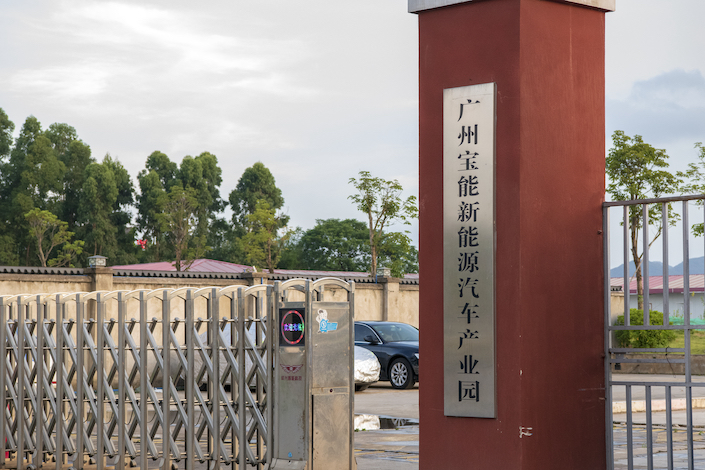
Shenzhen-based Baoneng Investment Group Co. Ltd. missed repayments on yet another debt to finance its unrealized car-making dream, underscoring the deepening capital crunch of the once-highflying private conglomerate.
Baoneng Motors Group Co. Ltd., the auto unit of Baoneng, failed to pay interest on a 2.8 billion yuan ($434 million) trust loan to finance a new-energy vehicle (NEV) industrial park project in Guangzhou, state-backed China Railway Trust Co. Ltd. disclosed. Baoneng and its controlling shareholder, Yao Zhenhua, offered guarantees for the product.
The loan was issued in May 2020 with a maturity period of 15 months. It raised funds to develop Baoneng’s NEV project, which started in 2017 but has made little progress so far.
Baoneng, a private property and financial services company, is the latest Chinese conglomerate to face a massive debt crisis. The company is best known for its failed 2015 hostile takeover attempt of major property developer China Vanke Co. Ltd.
The Baoneng capital crunch came into the spotlight since the beginning of this year. With 200 billion yuan of debt, Baoneng faces employees demanding unpaid wages, suppliers clamoring for overdue payments and creditors seeking loan payments.
China Railway Trust said a court in Chengdu ordered a freeze on some of Baoneng’s assets, including land use rights, properties, equities and guarantors’ accounts, to recoup losses from the defaulted loan.
Last month, Shandong International Trust Co. said Baoneng Motors failed to pay 67.5 million yuan of debt interest. Chongqing International Trust Co. Ltd. declared a Baoneng-related default on 2.2 billion yuan, and Shanghai AJ Trust Co. Ltd., on 518 million yuan.
Other trust firms also face risks on loans to Baoneng Motors, including Sino-Australian International Trust Co. Ltd., Zhongrong International Trust Co. Ltd., Cofco Trust Co. Ltd. and AVIC Trust Co. Ltd.
Yao, Baoneng’s 51-year-old founder and chairman, started Baoneng Motors in 2017 with registered capital of 1 billion yuan. The same year, the auto unit acquired a 51% stake in Qoros Auto Co. Ltd., a small Shanghai-based automaker, for 6.5 billion yuan. A year later, Baoneng spent an additional 1.56 billion yuan to increase its stake in Qoros to 63%.
In 2019, Baoneng took over French automaker PSA’s joint venture with Changan Automobile Co. Changan disclosed that it sold its 50% stake in the joint venture to Baoneng for 1.63 billion yuan. PSA didn’t disclose the value of its deal with Baoneng. Yao vowed to invest 10 billion yuan annually in the five years starting in 2018 to develop new vehicles and launch 26 models by 2022.
Between 2017 and 2020, Baoneng Motors spent 869 million yuan to acquire 1 million square meters of land in Guangzhou for the NEV industrial park project. But the land plot has largely remained idle and Baoneng Motors hasn’t produced a single car so far. The Guangzhou industrial park obtained billions of yuan of financing through the issuance of trust products.
In June, Baoneng said the Guangzhou government agreed to provide 12 billion yuan of strategic investment to Baoneng Motors as a rescue. Caixin learned that only 2.4 billion yuan of the investment fund arrived at Baoneng by early September.
Since September 2021, courts across China have issued 12 execution orders against Baoneng for debt disputes involving more than 17.6 billion yuan, public records showed. The company’s capital crunch also sparked fears in the bond market.
Shenzhen Jushenghua Co. Ltd., Baoneng’s core subsidiary and major financing platform, has 14 outstanding bonds totaling 11.7 billion yuan. Shenzhen Shum Yip Logistics Group Holdings Co. Ltd., another Baoneng financing arm, holds five outstanding bonds of 9 billion yuan, market data showed.
According to Dagong Global Credit Rating Co., Jushenghua defaulted a 1.59 billion yuan bond Sept. 30, with the next 410 million yuan bond due oct. 22.
Starting in the 2020 second half, Baoneng tried to repay debt by selling assets, but there are few of them that can generate cash quickly.
“All its land and office buildings have been used for collateral on its loans, and the interest rates are not low,” said one person familiar with the matter. The only liquid assets are Baoneng’s holdings of listed companies’ shares.
Since the 2020 second half, Qian Hai Life Insurance Co. Ltd., another core subsidiary of Baoneng, has offloaded more than 370 million publicly traded shares.
Denise Jia contributed to this story.
Contact reporter Han Wei (weihan@caixin.com) and editor Bob Simison (hello@caixin.com)
Get our weekly free Must-Read newsletter.







